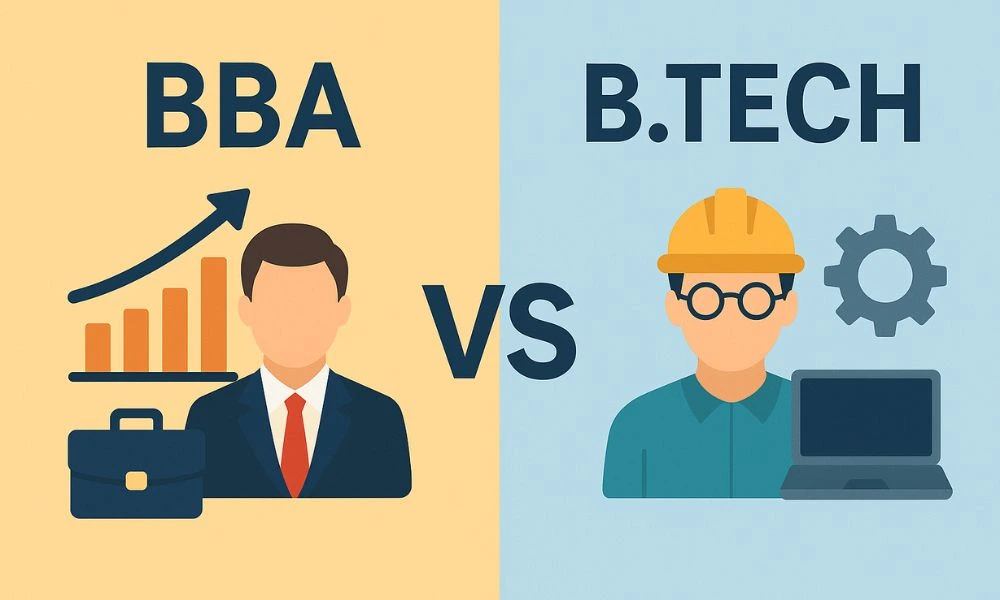BBA vs BTech Abroad: Which is Better?
Table of Contents
Thinking about studying abroad but confused between BBA and BTech? You’re not alone. This decision isn’t just about picking a subject. It’s about choosing the career you want. If you are someone who enjoys teamwork, business ideas, or dreaming up the next big brand, BBA might be your path. But if you love solving problems, coding, or figuring out how machines and systems work, then BTech could be a better fit.
Both courses are popular among international students, especially from India. But they’re very different in terms of what you’ll study, what kind of jobs you’ll get, and even how long your degree will take. In this guide, we’ll break down all the key differences, like eligibility, course style, job roles, and salary, so you can pick what’s right for you.
What’s the Main Difference Between BBA and BTech Abroad?
The main difference between BBA and BTech abroad lies in what you learn. It is also about how you learn it, and where it leads you professionally. BBA (Bachelor of Business Administration) focuses on the world of business. It covers topics like marketing, finance, entrepreneurship, and international business. This is for students who want to lead teams, run companies, or manage client-facing roles. The curriculum is theory-based. But it includes practical learning via case studies, group projects, and internships.
BTech (Bachelor of Technology) is all about engineering, innovation, and tech-based problem solving. You’ll go into subjects like coding, physics, AI, and machine design depending on your specialization. Learning is practical and technical, with a lot of focus on labs, programming, design projects, and internships. Following is the comparison between BBA and BTech Abroad:
| Feature | BBA Abroad | BTech Abroad |
| Focus | Business, Management, Finance, Marketing | Engineering, Programming, Design, AI |
| Learning Style | Theoretical + Case Studies | Practical + Labs + Technical Projects |
| Common Careers | Marketing Exec, Analyst, HR, Consultant | Software Engineer, Data Scientist, Developer |
| Duration | Typically 3 years | Typically 4 years |
| Growth Rate (Global) | ~7% job growth in business fields | ~13% job growth in tech/IT roles (US BLS) |
| Future Studies | MBA, MS in Management | MS, MTech, or PhD in Engineering/Tech |
Who Should Choose BBA Abroad?
If you are the kind of person who is interested in knowing how brands grow and why companies succeed or fail, BBA is for you. It is for students who are strategic, creative, and smart. You should be someone who thinks about the big picture and likes organizing ideas or teams. Doing BBA in abroad makes a lot of sense if:
- You enjoy subjects like economics, business studies, or marketing in school. These subjects build the base for courses like branding, consumer behavior, and finance.
- You can picture yourself working in global offices, launching product campaigns, or presenting ideas to clients. BBA grads go on to become business consultants, HR managers, project leads, or marketing strategists.
- You are drawn to networking, negotiation, or leading teams. Maybe you were the class rep, the event planner, or the go-to person during group projects. That’s leadership potential right there.
Studying BBA abroad also come with advantages like:
- Exposure to global business environments and diverse cultures.
- Access to internships at multinational companies and networking events with industry professionals.
- Learning from case studies of top firms like Google, Deloitte, or McKinsey.
- Opportunities to specialize in trending areas like sustainability management, FinTech, or digital transformation.
Who Should Choose BTech Abroad?
There is no harm in accepting that some people just get how things work. If you were the kid who loved exploring gadgets just to figure them out, BTech could be your calling. This course is made for people who have analytical skills and are naturally curious about systems, machines, or software. It’s not just about coding or wires. It is about solving real life problems using logic, design, and innovation. BTech in abroad makes sense if you:
- Have a strong interest in Math, Physics, or Computer Science. These subjects are the base of engineering, from coding algorithms to calculating fluid dynamics.
- You love figuring out how stuff works. Maybe it’s apps, maybe engines. Either way, you enjoy building things, fixing bugs, or optimizing systems.
- Dream of working at companies like Google, Tesla, Intel, IBM, or Siemens. BTech grads often have jobs in software development, aerospace, mechanical design, cybersecurity, and more.
According to the OECD, over 30% of international STEM students choose engineering or tech-related fields. This has made BTech one of the most sought-after degrees abroad. And in countries like the U.S, the average entry-level salary for a Computer Science engineer was $75,900 per year in 2024.
What is the Course Duration and Eligibility: BBA vs BTech
When people are thinking about choosing BBA and BTech, one of the first thing they think is how long the course is going to take? And what do I need to get in? While both programs provide global careers, their timelines and entry requirements are quite different. A BBA is typically faster to complete and has a wider eligibility window. It welcomes students from any field. On the other hand, BTech is a bit more specialized. It is for students from a science background with a strong grip on subjects like Math and Physics. Below is the comparison of BBA vs BTech:
| Feature | BBA Abroad | BTech Abroad |
| Duration | 3–4 years | 4 years (standard worldwide) |
| Stream Required | Any stream (Arts/Commerce/Science) | Science stream only (Physics, Chemistry, Math) |
| Minimum Grades | 50–60% in Class 12 | 60–70%+ in PCM subjects |
| English Tests | IELTS (6.0–6.5), TOEFL (80–90), Duolingo (100–110) | IELTS (6.0+), TOEFL, Duolingo, sometimes SAT/ACT |
| Additional Tests | Some universities may ask for SAT/ACT (optional) | SAT (math-focused), ACT, AP, IB HL, or entrance test |
| Ease of Entry | Moderate – flexible requirements | Competitive – stricter academic & subject criteria |
What’s the Course Structure Like in BBA vs BTech?
So, you’ve picked your degree and you’re eyeing that dream job. But what exactly can you do with a BBA or BTech abroad? Let’s break it down. A Bachelor of Business Administration (BBA) sets the stage for roles that involve planning, communication, and people management. You’ll find BBA grads making brand strategies, managing teams and crunching numbers in finance. Here’s what the career path can look like for BBA people:
- Marketing Executive: Think campaign planning, digital outreach, and customer insights.
- Business Analyst: Working with data to help companies make smarter decisions.
- HR Coordinator: Managing people, hiring talent, and shaping company culture.
- Operations Manager: Keeping the business running smoothly behind the scenes.
- Finance Associate: Handling budgets, reports, and financial forecasting.
- Sales Strategist or Consultant: Driving growth and client relationships.
In fact, according to QS Employment Insights 2024, BBA graduates saw a 9% year-on-year increase in global demand, especially in the U.S, UK, and Singapore. As of 2025, the average salary for BBA grads abroad is:
| Country | Avg. BBA Starting Salary |
| USA | $50,000 – $65,000/year |
| UK | £26,000 – £35,000/year |
| Canada | CAD 48,000 – 60,000/year |
| Australia | AUD 50,000 – 65,000/year |
Now, if you’re leaning towards BTech, you’re stepping into a world where innovation and technical expertise lead the way. This is for the problem-solvers, the ones who love building systems and seeing how things work. Here is a common job role in BTech abroad here:
- Software Developer: Writing code, building apps, and solving digital problems.
- Mechanical Engineer: Designing machines, tools, or automotive systems.
- Electrical Systems Analyst: Managing power systems or circuits in tech-heavy sectors.
- Data Engineer: Working behind the scenes to organize and analyze big data.
- IT Consultant: Helping firms make tech decisions and streamline operations.
- Product Designer: Creating functional, user-focused products (tech, hardware, etc.)
BTech grads are taken by Microsoft, Amazon, BMW, and many others. STEM careers are globally booming. According to the World Economic Forum, tech and engineering roles will account for 75% of the top emerging jobs by 2030. Below is the typical starting salary of BTech grads:
| Country | Avg. BTech Starting Salary |
| USA | $70,000 – $90,000/year |
| UK | £35,000 – £50,000/year |
| Canada | CAD 65,000 – 85,000/year |
| Germany | €45,000 – €65,000/year |
| Australia | AUD 65,000 – 85,000/year |
And it doesn’t stop there. Many students choose to specialize further with M.Tech, MS, or even pivot to an MBA, mixing tech skills with business insight—a powerful combination in today’s job market.
Conclusion
The best course depends on your strengths, interests, and career goals. If you’re curious about how businesses run, love planning things, or want to work in offices with clients and teams, go for BBA. It’s great for careers in marketing, HR, finance, and business consulting. But if you’re more into logic, numbers, and hands-on work with tech, BTech is the way to go. You’ll find opportunities in software development, engineering, AI, and more.
Whichever path you choose, make sure your student journey starts stress-free. From finding the perfect student housing abroad to settling in a new country, University Living has your back every step of the way. Explore verified student accommodations, compare options, and book your room early. Let’s make your study abroad dream a reality. Visit University Living today.
Frequently Asked Questions
Is BBA better than BTech?
It depends on what you want to do. BBA is great if you’re interested in business, leadership, and management. BTech is ideal if you enjoy technology, problem-solving, and innovation. Both are good, just in different fields.
Is doing BBA from abroad worth it?
Yes, especially if you choose a well-ranked university. It boosts your global exposure and opens up job options in marketing, finance, sales, and more. Most graduates land roles soon after finishing their degree.
In which country is BTech considered the best?
Top choices for engineering studies include:
USA – Best for research and tech jobs
Canada – Affordable with great post-study work options
Germany – Free or low-cost education, strong in mechanical and automotive engineering
Australia – Industry-ready courses, easy PR routes
UK – Shorter programs, global recognition
Pick one based on your career goals and budget.
In which country is BTech considered the best?
Top choices for engineering studies include:
USA – Best for research and tech jobs
Canada – Affordable with great post-study work options
Germany – Free or low-cost education, strong in mechanical and automotive engineering
Australia – Industry-ready courses, easy PR routes
UK – Shorter programs, global recognition
Pick one based on your career goals and budget.
What is the average salary after BBA abroad?
The average salary after BBA abroad varies by country:
USA: $50,000–$70,000 (₹42–58 lakhs) for freshers
Canada: CAD 46,000–82,000 (₹28–50 lakhs)
Australia: AUD 86,000–100,000 (₹53–61 lakhs)
With experience, these figures can increase significantly.
Is doing BTech from abroad worth it?
Yes, especially if you’re looking for global exposure, hands-on learning, and more job opportunities. You also skip tough entrance exams like JEE and get access to world-class labs and internships.
What are the top 5 branches in BTech?
Here are the most in-demand branches in BTech:
Computer Science Engineering (CSE) – Software, AI, data science
Mechanical Engineering – Machines, design, manufacturing
Civil Engineering – Infrastructure, construction, planning
Electrical Engineering – Power systems, electronics
Biomedical Engineering – Healthcare tech, medical devices


